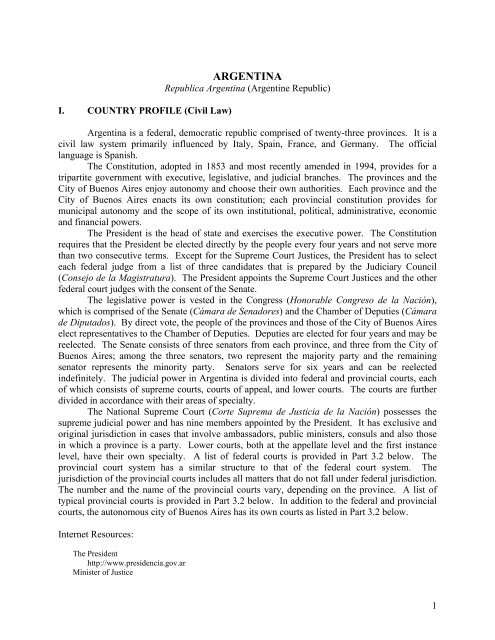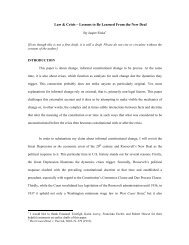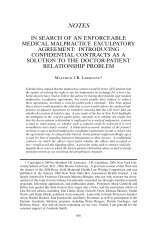Guide to Foreign and International Legal Citations - New York ...
Guide to Foreign and International Legal Citations - New York ...
Guide to Foreign and International Legal Citations - New York ...
You also want an ePaper? Increase the reach of your titles
YUMPU automatically turns print PDFs into web optimized ePapers that Google loves.
I. COUNTRY PROFILE (Civil Law)<br />
ARGENTINA<br />
Republica Argentina (Argentine Republic)<br />
Argentina is a federal, democratic republic comprised of twenty-three provinces. It is a<br />
civil law system primarily influenced by Italy, Spain, France, <strong>and</strong> Germany. The official<br />
language is Spanish.<br />
The Constitution, adopted in 1853 <strong>and</strong> most recently amended in 1994, provides for a<br />
tripartite government with executive, legislative, <strong>and</strong> judicial branches. The provinces <strong>and</strong> the<br />
City of Buenos Aires enjoy au<strong>to</strong>nomy <strong>and</strong> choose their own authorities. Each province <strong>and</strong> the<br />
City of Buenos Aires enacts its own constitution; each provincial constitution provides for<br />
municipal au<strong>to</strong>nomy <strong>and</strong> the scope of its own institutional, political, administrative, economic<br />
<strong>and</strong> financial powers.<br />
The President is the head of state <strong>and</strong> exercises the executive power. The Constitution<br />
requires that the President be elected directly by the people every four years <strong>and</strong> not serve more<br />
than two consecutive terms. Except for the Supreme Court Justices, the President has <strong>to</strong> select<br />
each federal judge from a list of three c<strong>and</strong>idates that is prepared by the Judiciary Council<br />
(Consejo de la Magistratura). The President appoints the Supreme Court Justices <strong>and</strong> the other<br />
federal court judges with the consent of the Senate.<br />
The legislative power is vested in the Congress (Honorable Congreso de la Nación),<br />
which is comprised of the Senate (Cámara de Senadores) <strong>and</strong> the Chamber of Deputies (Cámara<br />
de Diputados). By direct vote, the people of the provinces <strong>and</strong> those of the City of Buenos Aires<br />
elect representatives <strong>to</strong> the Chamber of Deputies. Deputies are elected for four years <strong>and</strong> may be<br />
reelected. The Senate consists of three sena<strong>to</strong>rs from each province, <strong>and</strong> three from the City of<br />
Buenos Aires; among the three sena<strong>to</strong>rs, two represent the majority party <strong>and</strong> the remaining<br />
sena<strong>to</strong>r represents the minority party. Sena<strong>to</strong>rs serve for six years <strong>and</strong> can be reelected<br />
indefinitely. The judicial power in Argentina is divided in<strong>to</strong> federal <strong>and</strong> provincial courts, each<br />
of which consists of supreme courts, courts of appeal, <strong>and</strong> lower courts. The courts are further<br />
divided in accordance with their areas of specialty.<br />
The National Supreme Court (Corte Suprema de Justicia de la Nación) possesses the<br />
supreme judicial power <strong>and</strong> has nine members appointed by the President. It has exclusive <strong>and</strong><br />
original jurisdiction in cases that involve ambassadors, public ministers, consuls <strong>and</strong> also those<br />
in which a province is a party. Lower courts, both at the appellate level <strong>and</strong> the first instance<br />
level, have their own specialty. A list of federal courts is provided in Part 3.2 below. The<br />
provincial court system has a similar structure <strong>to</strong> that of the federal court system. The<br />
jurisdiction of the provincial courts includes all matters that do not fall under federal jurisdiction.<br />
The number <strong>and</strong> the name of the provincial courts vary, depending on the province. A list of<br />
typical provincial courts is provided in Part 3.2 below. In addition <strong>to</strong> the federal <strong>and</strong> provincial<br />
courts, the au<strong>to</strong>nomous city of Buenos Aires has its own courts as listed in Part 3.2 below.<br />
Internet Resources:<br />
The President<br />
http://www.presidencia.gov.ar<br />
Minister of Justice<br />
1
















